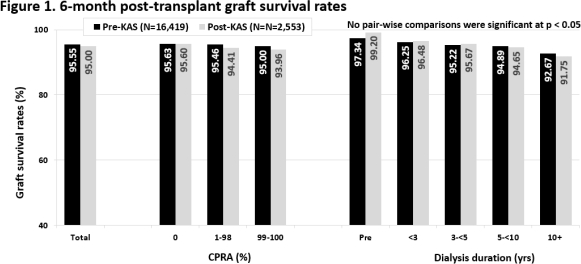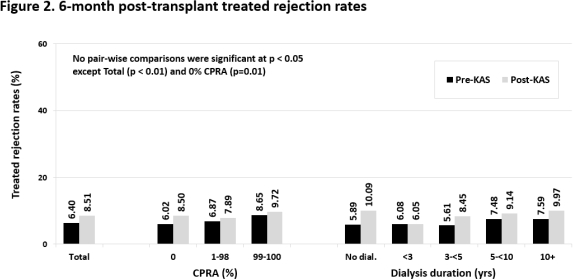Early Post-Transplant Patient, Graft Survival and Rejection Rates Under KAS.
UNOS, Richmond.
Meeting: 2016 American Transplant Congress
Abstract number: 495
Keywords: Allocation, Kidney transplantation, Rejection, Survival
Session Information
Session Name: Concurrent Session: Diabetes and Obesity in Kidney Transplantation
Session Type: Concurrent Session
Date: Tuesday, June 14, 2016
Session Time: 4:30pm-6:00pm
 Presentation Time: 5:42pm-5:54pm
Presentation Time: 5:42pm-5:54pm
Location: Room 302
Background: KAS, implemented on 12/4/14, resulted in changes in recipient, donor/recipient and tx characteristics that have the potential to affect post-tx outcomes.
Data and Methods: We compared 6-month patient & graft survival and treated rejection rates for deceased donor solitary kidney txs in 6/1/13-12/3/14 vs. 12/4/14-2/28/15. Unadjusted survival rates were computed using the Kaplan-Meier method. Rates were also adjusted for diagnosis (including retx and diabetes), ethnicity, age, CPRA, time on dialysis, KDPI, DCD, 0-ABDR and cold ischemia time. Adjustments were performed using Cox proportional hazards regression for survival and logistic regression for rejection rates. Results were based on OPTN data supplemented with CMS dialysis data.
Results: Unadjusted, 6-month patient and graft survival were statistically no different pre vs. post-KAS: 98.0% with CI [97.7, 98.2] vs. 97.7% [97.0, 98.3] (p=0.38) and 95.6% [95.2, 95.9] vs. 95.0% [94.1. 95.9] (p=0.22), respectively (Fig 1). Differences remained non-significant after adjusting: p= 0.59 for patient and p=0.53 for graft survival. There were no significant differences within each CPRA or dialysis group pre- vs. post-KAS.
The unadjusted treated rejection rate was significantly higher post-KAS (6.4% vs. 8.5%, p<0.01), but it became insignificant after adjusting (p=0.11). This suggests that the post-KAS increase in rejection rates is at least partially due to a shift in recipient characteristics.


Conclusions: Unadjusted 6-month patient and graft survival were statistically no different under KAS and rejection rates increased, although sample sizes and statistical power are limited. Some of the post-KAS changes in recipient, donor/recipient and tx characteristics have the potential to affect both short- and long-term outcomes. Additional follow-up will be performed to determine clinical and statistical significance of changes in post-tx outcomes under KAS.
CITATION INFORMATION: Kucheryavaya A, Stewart D, Klassen D. Early Post-Transplant Patient, Graft Survival and Rejection Rates Under KAS. Am J Transplant. 2016;16 (suppl 3).
To cite this abstract in AMA style:
Kucheryavaya A, Stewart D, Klassen D. Early Post-Transplant Patient, Graft Survival and Rejection Rates Under KAS. [abstract]. Am J Transplant. 2016; 16 (suppl 3). https://atcmeetingabstracts.com/abstract/early-post-transplant-patient-graft-survival-and-rejection-rates-under-kas/. Accessed July 12, 2025.« Back to 2016 American Transplant Congress
